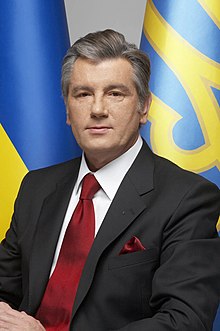Viktor Yushchenko | |
|---|---|
Віктор Ющенко | |
 Official portrait, 2008 | |
| 3rd President of Ukraine | |
| In office 23 January 2005 – 25 February 2010 | |
| Prime Minister | |
| Preceded by | Leonid Kuchma |
| Succeeded by | Viktor Yanukovych |
| 7th Prime Minister of Ukraine | |
| In office 22 December 1999 – 29 May 2001 Cabinet Yushchenko Government | |
| President | Leonid Kuchma |
| Deputy | Yuriy Yekhanurov |
| Preceded by | Valeriy Pustovoitenko |
| Succeeded by | Anatoliy Kinakh |
| Governor of the National Bank of Ukraine | |
| In office January 1993 – 22 December 1999 | |
| Preceded by | Vadym Hetman |
| Succeeded by | Volodymyr Stelmakh |
| People's Deputy of Ukraine | |
| In office 14 May 2002 – 23 January 2005 | |
| Constituency | Our Ukraine Bloc, No. 1 |
| Personal details | |
| Born | 23 February 1954 Khoruzhivka, Sumy Oblast, Soviet Union |
| Political party |
|
| Other political affiliations | Communist Party of Ukraine (1980–1991) Independent (1991–2002, 2004–2005) |
| Spouses |
|
| Children | Vitalina Yushchenko, Andriy Yushchenko, Sophia, Khrystyna, Taras |
| Alma mater | |
| Signature | |
| Website | www |
| Military service | |
| Allegiance | Soviet Union |
| Branch/service | Border Guard unit of KGB |
| Years of service | 1975–1976 |
| Rank | Captain |
Viktor Andriiovych Yushchenko (Ukrainian: Віктор Андрійович Ющенко, IPA: [ˈwiktor ɐnˈd⁽ʲ⁾r⁽ʲ⁾ijowɪtʃ ˈjuʃtʃenko] ; born 23 February 1954) is a Ukrainian politician who was the third president of Ukraine from 23 January 2005 to 25 February 2010. He aimed to orient Ukraine towards the West, European Union and NATO.
Yushchenko's first career was in the banking industry. In 1993, he became governor of the National Bank of Ukraine, presiding over their response to hyperinflation and the introduction of a national currency. From 1999 to 2001 he was prime minister under President Leonid Kuchma. After his dismissal as prime minister, Yushchenko went into opposition to President Kuchma and founded Our Ukraine Bloc, which at the 2002 parliamentary election became Ukraine's most popular political force.
As an informal leader of the Ukrainian opposition coalition, he was one of the two main candidates in the 2004 Ukrainian presidential election, the other being Prime Minister Viktor Yanukovych. During the election campaign in late 2004, Yushchenko became the victim of an assassination attempt when he was poisoned with dioxin. He suffered disfigurement as a result of the poisoning, but survived. The runoff election in November 2004, won by Yanukovych, was marred by widespread accusations of election fraud, leading to the Orange Revolution and an order by the Ukrainian Supreme Court to repeat the vote. Yushchenko won the revote 52% to 44%.
Yushchenko's influence declined soon after assuming the presidency, especially after falling out with his prime minister and leading political ally Yulia Tymoshenko, as did his and his party's popularity and electoral standing. The rest of his presidency was marked by infighting, legislative deadlock and coalition crises in 2007 and in 2008. He lost re-election to Yanukovych in the 2010 Ukrainian presidential election, finishing in fifth place in the first round with 5.5% of the vote. Yushchenko again led Our Ukraine in the 2012 parliamentary election, but they failed to win representation.